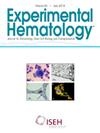年龄如何影响人类造血干细胞和祖细胞以及减轻造血干细胞老化的策略。
IF 2.1
4区 医学
Q2 HEMATOLOGY
引用次数: 0
摘要
造血干细胞(hsc)是血液形成的核心,在造血和全身衰老中起着关键作用。随着年龄的增长,造血干细胞发生了显著的功能变化,如干细胞池增加,归巢和重构能力下降,向髓细胞和巨核细胞/血小板祖细胞倾斜分化。这些表型改变可能是由于某些克隆的扩张,即克隆造血(CH),导致造血稳态被破坏,包括贫血、免疫功能受损、血液系统恶性肿瘤的风险增加,甚至与心血管疾病有关,突出了HSC衰老对整体健康的更广泛影响。HSC衰老是由一系列内在和外在因素驱动的,如DNA损伤积累、表观遗传重塑、炎症和代谢调节等。在这篇综述中,我们总结了在哺乳动物模型中,特别是在人类研究中,对HSPCs年龄相关变化和衰老过程机制的最新认识。此外,我们还提供了潜在的治疗策略,以抵消衰老过程和增强HSC再生能力,这将支持治疗干预和促进健康衰老。本文章由计算机程序翻译,如有差异,请以英文原文为准。
How age affects human hematopoietic stem and progenitor cells and the strategies to mitigate aging
Hematopoietic stem cells (HSCs) are central to blood formation and play a pivotal role in hematopoietic and systemic aging. With aging, HSCs undergo significant functional changes, such as an increased stem cell pool, declined homing and reconstitution capacity, and skewed differentiation toward myeloid and megakaryocyte/platelet progenitors. These phenotypic alterations are likely due to the expansion of certain clones, known as clonal hematopoiesis (CH), which leads to disrupted hematopoietic homeostasis, including anemia, impaired immunity, higher risks of hematological malignancies, and even associations with cardiovascular disease, highlighting the broader impact of HSC aging on overall health. HSC aging is driven by a range of mechanisms involving both intrinsic and extrinsic factors, such as DNA damage accumulation, epigenetic remodeling, inflammaging and metabolic regulation. In this review, we summarize the updated understanding of age-related changes in hematopoietic stem and progenitor cells (HSPCs) and the mechanisms underlying the aging process in mammalian models, especially in human study. Additionally, we provide insights into potential therapeutic strategies to counteract aging process and enhance HSC regenerative capacity, which will support therapeutic interventions and promote healthy aging.
求助全文
通过发布文献求助,成功后即可免费获取论文全文。
去求助
来源期刊

Experimental hematology
医学-血液学
CiteScore
5.30
自引率
0.00%
发文量
84
审稿时长
58 days
期刊介绍:
Experimental Hematology publishes new findings, methodologies, reviews and perspectives in all areas of hematology and immune cell formation on a monthly basis that may include Special Issues on particular topics of current interest. The overall goal is to report new insights into how normal blood cells are produced, how their production is normally regulated, mechanisms that contribute to hematological diseases and new approaches to their treatment. Specific topics may include relevant developmental and aging processes, stem cell biology, analyses of intrinsic and extrinsic regulatory mechanisms, in vitro behavior of primary cells, clonal tracking, molecular and omics analyses, metabolism, epigenetics, bioengineering approaches, studies in model organisms, novel clinical observations, transplantation biology and new therapeutic avenues.
 求助内容:
求助内容: 应助结果提醒方式:
应助结果提醒方式:


